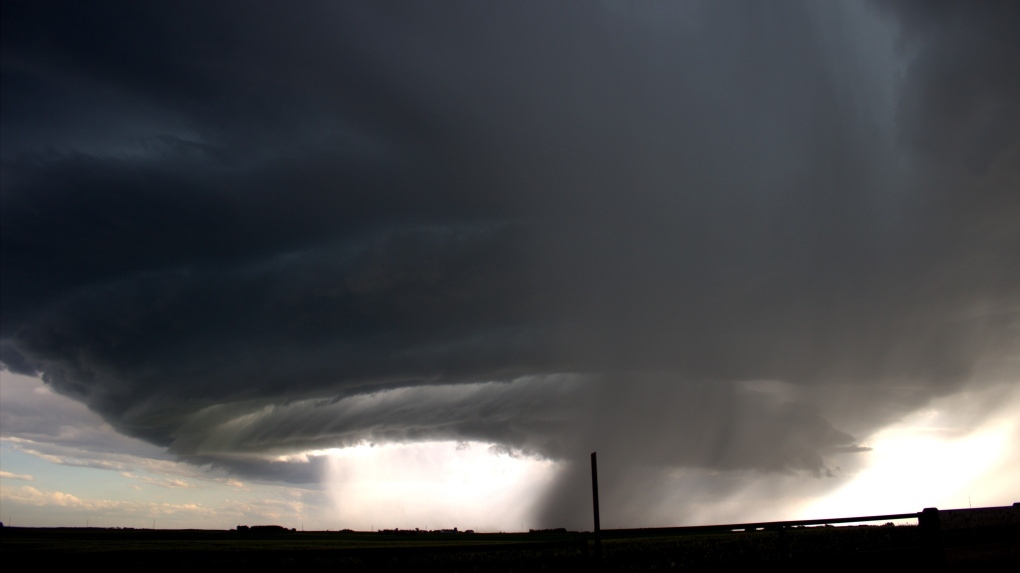On this day in weather: The third deadliest tornado in Canadian history hit Windsor
 A supercell is seen over an area east of Calgary in a July 13, 2019, handout photo. As of Monday afternoon, there have been 18 tornadoes in the province according to Environment and Climate Change Canada. (THE CANADIAN PRESS/HO-Chris Kiernan)
A supercell is seen over an area east of Calgary in a July 13, 2019, handout photo. As of Monday afternoon, there have been 18 tornadoes in the province according to Environment and Climate Change Canada. (THE CANADIAN PRESS/HO-Chris Kiernan)
A potent F4 tornado devastated parts of the city of Windsor and the municipality of LaSalle – 75 years ago.
The twister killed 17 people and caused excessive damage to homes and infrastructure. Damages tallied at almost $10 million dollars ($141 million in 2020 dollars.).
It is Canada’s third deadliest tornado in recorded history.
A line of thunderstorms originated near River Rouge, Mich. – then moved east into southwestern Ontario.
Eye-witness reports say from that thunderstorm activity a tornado developed touching down in Windsor.
Local farmland, residences and power lines were wrecked by the twister’s violent winds.
The F-4 tornado travelled approximately 60 km and as wide as a football field.
Eventually the tornado moved through parts Tecumseh before fizzling out over Lake St. Clair.
Subsequent reports of extreme damage — including reports of houses being torn off of their foundations has some experts suggesting that it may have been an F-5 strength tornado.
An F-5 is the highest category rating of a tornado’s strength – which is based on the observable damage caused in the event.
CTVNews.ca Top Stories

B.C. tenants evicted for landlord's use after refusing large rent increase to take over neighbouring suite
Ashley Dickey and her mother rented part of the same Coquitlam duplex in three different decades under three different landlords.
Mountain guide dies after falling into a crevasse in Banff National Park
A man who fell into a crevasse while leading a backcountry ski group deep in the Canadian Rockies has died.
Expert warns of food consumption habits amid rising prices
A new survey by Dalhousie University's Agri-Food Analytics Lab asked Canadians about their food consumption habits amid rising prices.
MPP Sarah Jama asked to leave Ontario legislature for wearing keffiyeh
MPP Sarah Jama was asked to leave the Legislative Assembly of Ontario by House Speaker Ted Arnott on Thursday for wearing a keffiyeh, a garment which has been banned at Queen’s Park.
Charlie Woods, son of Tiger, shoots 81 in U.S. Open qualifier
Charlie Woods failed to advance in a U.S. Open local qualifying event Thursday, shooting a 9-over 81 at Legacy Golf & Tennis Club.
Ex-tabloid publisher testifies he scooped up possibly damaging tales to shield his old friend Trump
As Donald Trump was running for president in 2016, his old friend at the National Enquirer was scooping up potentially damaging stories about the candidate and paying out tens of thousands of dollars to keep them from the public eye.
Here's why provinces aren't following Saskatchewan's lead on the carbon tax home heating fight
After Prime Minister Justin Trudeau said the federal government would still send Canada Carbon Rebate cheques to Saskatchewan residents, despite Saskatchewan Premier Scott Moe's decision to stop collecting the carbon tax on natural gas or home heating, questions were raised about whether other provinces would follow suit. CTV News reached out across the country and here's what we found out.
Montreal actress calls Weinstein ruling 'discouraging' but not surprising
A Montreal actress, who has previously detailed incidents she had with disgraced Hollywood producer Harvey Weinstein, says a New York Court of Appeals decision overturning his 2020 rape conviction is 'discouraging' but not surprising.
Caleb Williams, Jayden Daniels and Drake Maye make it four NFL drafts with quarterbacks going 1-3
Caleb Williams is heading to the Windy City, aiming to become the franchise quarterback Chicago has sought for decades.

































